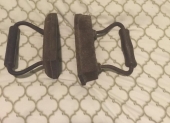Well, you know, water is pretty good.
Maybe you already covered this in the book.
For both laundry and dishes, water is the main cleaning agent.
Boiling water is especially good; for some things, it's better than soap.
Rinsing with boiling water is called "scalding," it gets most gunk off, and kills a lot of germs in the process.
I use this on most kinds of heat-safe dishes, from wooden spoons to glassware to the sink itself.
Boiling for about three minutes (some sources say 10) kills germs in sponges and dishrags. It eliminates most of the nasty odors, although it doesn't entirely clear out the gunk the germs were feeding on.
So I will either do several boiling rinses if I have time / limited other options (like an office breakroom); or I will boil a batch once, then wash the sludge out in my tiny washing machine (the advantage being, after boiling, it doesn't stink up the washer, and I don't have any reason to use bleach-type stuff on the washer afterwards.)
I do use a biodegradable eco-detergent for routine washing; but some of our friends use soap nuts in the laundry washer. I would not call them "edible" for humans, but they're pretty bio-compatible.
For pot and pans that get heated above boiling point, like cast iron, they tend to self-sterilize with each use. I will leave a coating of oil or butter on there, and I don't mind if it's the same oil I used to cook
pancakes. (If your oil is going rancid between cooking, you could make the case that you own too many pots, or don't cook often enough. In that case, wipe off the old oil, leaving a very thin coating.
For sticky foods in cast iron, like gravy, I like to store or eat as much of it as practical; wiping out with bread while it's still fresh and tasty saves on paper towels or washrags.
Then rinse with boiling water, scraping any stuck-on bits with a wooden scraper. Avoiding soap on cast iron is part of preserving its non-stick cooking surface.
Avoiding mess is another good tactic, where edibles can be used. Think "edible dishes" - such as bread trenchers, chowder or chili in a bread bowl, tortilla-lined baskets, or good ol' buns or sandwiches - is another trick for reducing the amount of dishes to begin with. Lettuce or cabbage leaves, for the gluten-wary (most of us really don't need that much bread in our diet).
Leafy liners can minimize the cleanup from serving meat and seafood, or free yourself to experiment with porous serving ware such as wooden bowls or unglazed / hand-glazed pottery.
The alternative, scrubbing with abrasives, is called "scouring." People used to use scouring-rush, sand, or baking soda for this. I've seen salt or sugar-based scouring stuff lately, especially for the shower; you can do the same for glass carbuoys, when you have some gunge in there that isn't easy to get out with a brush, put some rock salt in there with a tiny bit of hot water, and swish it around like a rock-polisher. Takes a while, but gets it done.
I don't like it as much, because it can scratch the surfaces you are trying to clean, which leads to it being easier to stain or dirty in future. Also note that baking soda, while OK for people in modest quantities, contains a lot of sodium which is a plant toxin.
If you're doing non-toxic cleaners for the good of the planet, not just your own chemical exposure, it's good to know what minerals are safer for plants in your area. In some inland areas, a little phosphorus is much appreciated by plants, where boron is excess and suppresses growth. Right on the coast, most plants are adapted to excess sodium; but not so inland. Ag schools' extension services can give you the lowdown for your area, or you can do soil samples if you're really into details.
I do use biodegradable dish soaps or detergents for routine dishwashing, combined with very hot water, so I don't need much. Apparently it's working for the plant life outside our greywater dish station, at any rate.
Final tip from a brief season in an organic winery: Wash promptly.
If everything is rinsed immediately, with hot water, and dried as soon as possible, you don't need to use chemical sterilants to kill unwanted films and colonies of unwanted life... because you don't provide it food or habitat.
Now ask me, does my kitchen reflect all this lovely-sounding advice?
[two guesses...]
-Erica






 9
9




 2
2












 1
1











